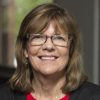Laurie deBettencourt, PhD, has seen a lot of change since her first special education classroom 45 years ago. “It was before the Individuals with Disabilities Education Act, and I had students other teachers didn’t want—in the basement of a building that frequently flooded,” recalls deBettencourt, who will retire at the end of December 2021 as professor and faculty lead for special education programs at the Johns Hopkins School of Education. “But I loved the challenge of putting the pieces together to help children thrive and learn.”
Training special educators to solve those kinds of challenges and help non-traditional learners thrive became her calling. “There are three aspects to my work: research; service to my university, community, and profession; and a real love of teaching individuals to understand kids with different disabilities,” says deBettencourt, who began teaching in higher education in 1984. Since joining JHU in 2006, she has been principal investigator on multiple grant projects, co-authored several textbooks, written numerous articles, and served as editor for Teacher Education and Special Education for ten years, earning the TESE Editor Award in 2019 for her service.
Her Johns Hopkins committee work ranged from service on the university’s accreditation committee in 2014 to serving on the Promotions Committee for 12 years.
“Laurie has been a stalwart leader across the university and is recognized globally for her expertise,” Dean Christopher Morphew says. “Her passion for her students and the children they teach is her greatest legacy.”
Tamara Marder, PhD, associate professor and program coordinator for SOE’s Applied Behavior and Analysis and Autism programs, agrees: “Laurie has been at the forefront of research on how we prepare the next generation of special educators at the school level and in academia.” deBettencourt’s recent Maryland Department of Education grants to train paraeducators and other professionals as special educators speaks to her impact, Marder says. “Prior to the pandemic, we were already seeing a shortage of special education teachers,” she explains. “The pipeline is critical to address the shortage. Training paraeducators is an excellent example of how Laurie is always looking for ways to support her students and the field.”
deBettencourt is quick to name her career highpoint. “My Fulbright Scholarship at the Special Education Institute of Eötvös Loránd University in Budapest, Hungary in 2018 was transformative,” she says. It inspired more international work as an ongoing Fulbright reviewer, and, after onboarding two new SOE special education professors, deBettencourt plans to travel to Budapest. (Paris and a few U.S. national parks are also on the agenda.)
Reflecting on her career and impact takes her back to her goals in her first, perennially damp classroom: “All I wanted was to have made a difference in people’s lives.”

